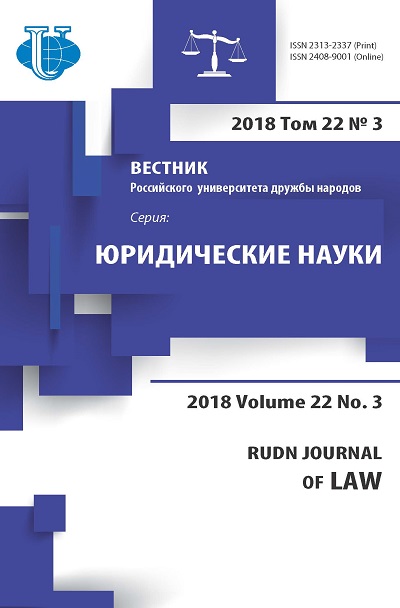Review of the I International Scientific Conference «Law as a Phenomenon of Civilization and Culture». Moscow, RUDN University, 30-31 March 30-31, 2018
- Authors: Mikheeva T.T.1, Zinkovskiy S.B1, Lapo P.V1, Grafshonkina A.A1
-
Affiliations:
- Peoples’ Friendship University of Russia
- Issue: Vol 22, No 3 (2018)
- Pages: 410-424
- Section: REVIEWS OF SCIENTIFIC EVENTS
- URL: https://journals.rudn.ru/law/article/view/20777
- DOI: https://doi.org/10.22363/2313-2337-2018-22-3-410-424
- ID: 20777
Cite item
Full Text
Abstract
On March 30-31, 2018, the I International Scientific Conference “Law as a Phenomenon of Civilization and Culture” was held at the Law Institute of the Peoples' Friendship University of Russia (hereinafter - RUDN). The event was co-founded by the Federation Council Committee on Constitutional Legislation and State Building of the Federal Assembly of the Russian Federation.
About the authors
Tsybik Ts Mikheeva
Peoples’ Friendship University of Russia
Author for correspondence.
Email: mikheeva_tsts@rudn.university
Candidate of Juridical Sciences, Associate Professor of the Department of History of Law and State, Law Institute, RUDN University
Miklukho-Maklaya, 6, Moscow, Russia, 117198Sergey B Zinkovskiy
Peoples’ Friendship University of Russia
Email: zinkovskiy_sb@rudn.university
Candidate of Juridical Sciences, Associate Professor of the Department of Theory of Law and State, Law Institute, RUDN University
Miklukho-Maklaya, 6, Moscow, Russia, 117198Pavel V Lapo
Peoples’ Friendship University of Russia
Email: lapo_pv@rudn.university
Candidate of Juridical Sciences, Senior Lecturer of the Department of History of Law and State, Law Institute, RUDN University
Miklukho-Maklaya, 6, Moscow, Russia, 117198Anastasiya A Grafshonkina
Peoples’ Friendship University of Russia
Email: grafshonkina_aa@rudn.university
Candidate of Juridical Sciences, Senior Lecturer of the Department of History of Law and State, Law Institute, RUDN University
Miklukho-Maklaya, 6, Moscow, Russia, 117198References
Supplementary files















